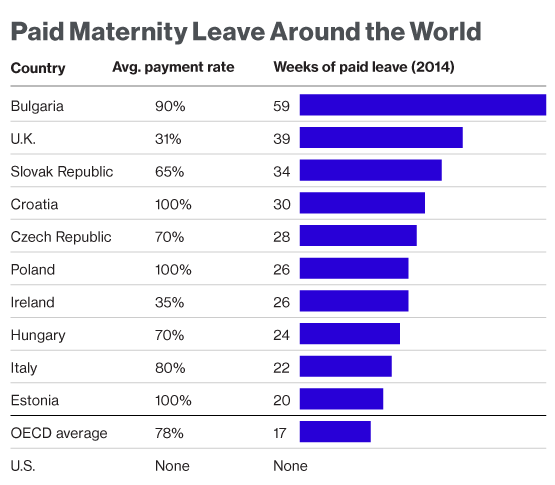 If you’ll soon be a parent, you need to do a lot of planning to make sure your new son or daughter is well cared for. One thing you can’t plan on is paid maternity or paternity leave to help you care for that newborn or adopted child. The Family Medical Leave Act (FMLA) is a federal law that allows some employees up to 12 weeks of time off to care for themselves or an immediate family member.
If you’ll soon be a parent, you need to do a lot of planning to make sure your new son or daughter is well cared for. One thing you can’t plan on is paid maternity or paternity leave to help you care for that newborn or adopted child. The Family Medical Leave Act (FMLA) is a federal law that allows some employees up to 12 weeks of time off to care for themselves or an immediate family member.
But is FMLA leave paid?
There are no federal requirements the leave be paid, though an employer can require that available paid time off (such as vacation or sick time) be used as part of the leave. The FMLA can be used as maternity leave, but the fact that it’s unpaid stands out. The United States is the only developed country, and only one of eight nations on the planet, without a requirement for paid maternity leave.
Federal Laws Covering Family Medical and Maternity Leaves
Two federal laws are related to maternity leave.
- The FMLA allows eligible employees to take leave for a serious health condition making the employee unable to perform the essential functions of his or her job or to care for an immediate family member.
- This includes the birth of a child or to care for the employee’s newly born, adopted, or foster child.
- Government agencies and private firms employing at least 50 workers within 75 miles are covered by the law.
- Employees are eligible for leave if they work 1,250 hours in a year and have worked at least 12 months for their current employer, if their employer is otherwise covered by the law.
- As of 2012, due to these restrictions, only 59% of employees worked at covered firms and met all the FMLA benefit eligibility requirements.
- One study estimates that 23% of women who used FMLA leave after giving birth were back at work within two weeks.
- Retaliation against employees for requesting or receiving a leave is prohibited.
- The Pregnancy Discrimination Act (PDA) prohibits employers from treating a female employee unfavorably due to pregnancy, childbirth, or a medical condition related to pregnancy or childbirth.
- It forbids discrimination based on pregnancy when it comes to any aspect of employment, including fringe benefits such as leave, health insurance, paid sick days, and temporary disability insurance (TDI).
- Employers must provide the same leave to a woman due to medical conditions associated with pregnancy and childbirth as that provided to any employee with a medical condition or temporary disability, such as a broken leg or a heart attack.
- Paid leave for pregnancy- or birth-related issues is not required by the PDA unless an employer provides paid leave or disability benefits for other medical conditions.
Local Laws and Voluntary Employer Participation
 There are no local laws in Maryland, Virginia, or the District of Columbia requiring paid maternity leave for employees. California, Hawaii, New Jersey, New York, Rhode Island, and Puerto Rico have laws enabling employees going out on leave to receive at least partial wage replacement while on disability leave or on leave related to pregnancy or childbirth.
There are no local laws in Maryland, Virginia, or the District of Columbia requiring paid maternity leave for employees. California, Hawaii, New Jersey, New York, Rhode Island, and Puerto Rico have laws enabling employees going out on leave to receive at least partial wage replacement while on disability leave or on leave related to pregnancy or childbirth.
Several states have laws requiring greater, though still unpaid, family medical leave than the federal FMLA. Virginia and Maryland are not among them. The District of Columbia FMLA allows for up to 16 weeks of unpaid leave, and the employee need only work 1,000 hours during the 12-month period before the family or medical leave can be taken.
Employers are free to offer paid family medical leave and/or maternity leave to their employees. Under the PDA, if that’s done, it mustn’t be structured in a way that discriminates against pregnant women. Only 12% of the American workforce has access to paid family leave, according to the federal Bureau of Labor Statistics.
How the U.S. Compares to the Rest of the World
Not well. A working mother can take time off to be with a newborn and still be paid in 183 countries. Fathers can do the same in almost as many countries. On average, their combined leave amounts to 37 weeks at roughly three-quarters pay, according to Bloomberg.
- We are the only developed country whose government doesn’t require employers to provide paid maternity or paternity leave or provide it as a tax-supported benefit.
- Nearly every member of the European Union provides at least 14 weeks of paid maternity leave, during which workers receive at least two-thirds of their regular earnings, according to the International Labour Organization.

Source: Bloomberg
In the 1970s, Europe and other industrialized nations made paid maternity leave the norm as more women entered the workforce. These leaves are funded by taxes and considered an extension of social security programs or the result of mandates on businesses that pay for them or share the cost with the government.
Summing It Up
Federal and local laws regulate family medical leave.
- Paid family medical leave for parents of newborns or newly adopted children is not required to be offered by employers by federal or local laws.
- The PDA requires that if paid leave is offered for medical reasons, those benefits must not discriminate against pregnant employees.
- The family medical leave that is required by federal and state laws allows for unpaid leave that could be used for maternity leave. Up to 12 weeks is required under federal, Maryland, and Virginia law; 16 weeks is required under the District of Columbia’s FMLA.
- Due to eligibility restrictions, a large part of the working population doesn’t qualify for family medical leave, and because the time off is unpaid, many workers who may qualify can’t afford to use it.
The CIA ranks the world’s nations’ gross domestic product (which measures economic production), and the U.S. is listed as the third-largest economy after China and the combined economies of the European Union. While the vast majority of Americans don’t have access to paid family or maternity leave, residents of the Ukraine (ranked 49th), Panama (91st), and Iceland (151st) do. While virtually all of the rest of world thinks it’s important to allow parents paid time off to be parents, that viewpoint is not shared by enough of those in the American political system to make it a reality here.
The Spiggle Law Firm represents those who have been denied family medical leave or retaliated against because they sought or obtained these benefits. If you or a family member has been denied FMLA benefits, you have suffered negative consequences because of family medical leave, or your employer may have violated the PDA, contact our office so we can talk about the situation, the law, and your best options for moving forward.





